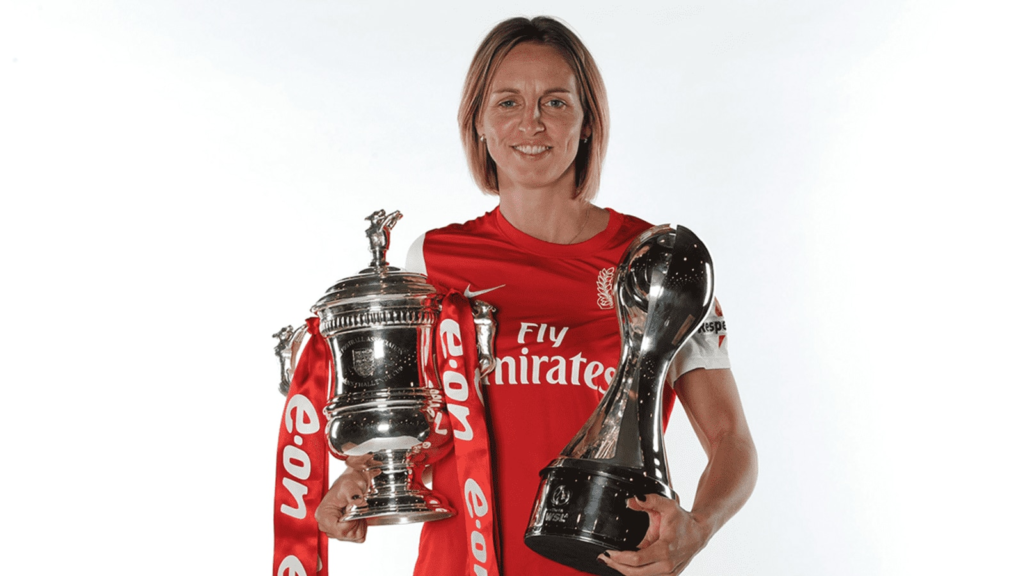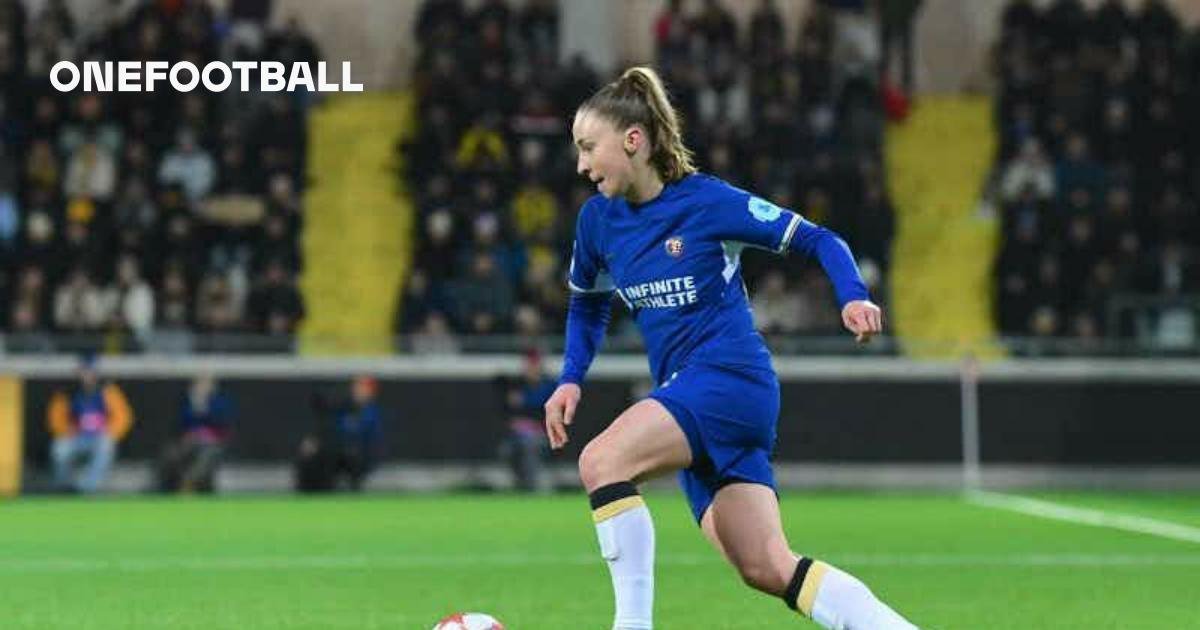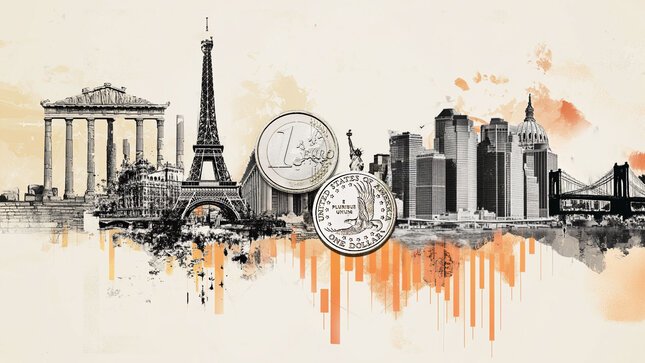When it comes to the history of Arsenal Women, few players span eras – embody eras, even – more than Faye White.
She captained Arsenal and England for over a decade and played for the Gunners for more than 15 years, collecting 31 major trophies and captaining her country at four major tournaments along the way.
For Faye, football was very much part of the wallpaper in her family life from an early age. “I grew up with it,” she says. “It was me and my older brother, so I was out and about at the weekend with his football team, which my dad managed, and then my dad played on a Sunday, so I was always out with a ball at my feet.”
Having a football-oriented family meant that access was not a problem for White growing up in west Sussex. “As young as seven or eight I was doing drills in training with boys two years older than me,” she says. “I wasn’t allowed to play matches but because my dad was manager it was easy to get involved in training.”
Her love of playing spilt over into her teenage years: “Once I got to 14 or so and the physicality gap began to show, my mum and I tried to find a girls’ team. I went to a local leisure centre for a half-term football event in Horley near where I grew up. There happened to be a female coach there who managed Horsham Reserves and she said I should trial for them, so I did and it started from there. By the time I was 15 or 16 I was playing in the first team.”
“I started my first training session, but then I got so nervous I couldn’t carry on”
While White was no longer playing against boys, she was playing against women much older than her. It seemed to be only a matter of time before a top-flight club came calling. “I played in a League Cup game against Arsenal. We lost 3-0 I think, but I had to mark Marieanne Spacey,” White recalls. It was a precursor to a meeting with a familiar figure.
“Vic Akers had already heard about me because I had been to an England camp. He came to McDonald’s at Gatwick Airport to meet me because that was the easiest place I could think for him to get to off the M23!”
White had other offers on the table but says she was dazzled by a subsequent meeting with Akers. The annual leave plans of a former Arsenal legend also contributed to her signing for the Gunners.
“I was thinking about playing for Croydon, because I spoke to their manager Debbie Bampton, but she was on holiday for two weeks, and in the meantime, Vic swooped in. He took me to Highbury in the box above the Clock End, overlooking the training pitches behind the Clock End, and I just said: ‘where do I sign?’”
From playing for Horsham as a teenager, White was suddenly training with legends of women’s football – the gravity of which was not lost on her. “I started my first training session, but then I got so nervous I couldn’t carry on. I needed a bit of a break because it was overwhelming training with Marieanne Spacey, Sian Williams and Kirsty Pealling.
“I was 17, travelling from Horsham and waiting for Vic to come and get me from outside King’s Cross station because I didn’t know the Tube well enough.” White says he was far more than just a football manager.
“You could tell something special was happening”
“Vic had to do everything back then: pick players up, set the training up, do his job as the kit man for the men’s team.” White says his resourcefulness in the amateur era was key to the club’s success. “Vic was a man of few words. He wouldn’t talk too much about performances, but he would show you what he thought in other ways, like going the extra mile for players and getting them other pairs of boots or giving you extra kit.
“He went above and beyond to get players who had come from places like Ireland into flats near the club. Or he created jobs for girls in the laundry. He got me an admin job at the training ground; we didn’t have a big budget so he had to be very resourceful and creative.”
Playing in such a dominant domestic side, White was being groomed for a long and successful England career. Faye says the transition from Arsenal to England was far easier than from Horsham to Arsenal.
“We had about nine England internationals at Arsenal, we had the Welsh and Irish captains in Jayne Ludlow and Ciara Grant, we had Julie Fleeting from Scotland. Vic just seemed to know everyone – he was always on the phone talking about an up-and-coming player.”
With the formation of the UEFA Champions League (known as the UEFA Women’s Cup until 2009), White oversaw a new generation of young talent such as Lianne Sanderson, Karen Carney, Alex Scott and Anita Asante. She says she could sense something special was brewing.
“Even in the Champions League we felt very strong, and we would usually get to the quarter or semi-finals. You could tell something special was happening and it was great to be part of a team that strong.”
White was the captain of the legendary quadruple-winning team of 2006/07, yet she played very little during that campaign due to an ACL injury. In fact, she was an 89th-minute substitute in the second leg of the final against Umea. “I was the time-wasting sub!” she says without a hint of remorse.
“It wasn’t always easy being captain of Arsenal and England”
White says she has that season in proper perspective, even though she was on the periphery in pure playing terms.
“It’s one of the seasons I’m proudest of because it’s about the team and it was a momentous achievement for women’s football in England. It put us on a map even more. It was my second ACL so I already had that perspective of appreciating when you get back and when you get to come on, because you know how hard it is to come back, especially for the second time and on the other leg! It just put things in perspective – but I was still part of that team.”
White ended that campaign by leading her country in the 2007 World Cup in China. “It all worked out,” she reflects. Having won 90 England caps over a period of 14 years, she is well-positioned to reflect on the advances in the national team, too.
“When I started we would play in massive hand-me-down kits from the men and we stayed in Holiday Inns sharing jacuzzis with business people. It’s a world apart now.
“Unfortunately St George’s Park opened the year I retired. When I started playing for England we hadn’t qualified for a major tournament for years. By the time I left we had got to the Euros final, in 2009, and got to sixth in the world rankings. The financial support we got at that time was very different from the USA, Germany and Sweden, for example.”
The towering defender says her dual role as captain for the national team and the biggest club in the country came with a responsibility to promote women’s football. “It wasn’t always easy being captain of Arsenal and England,” she recalls. “There was a media side and a responsibility to try to get interest and grow the game and bash down some walls.
“Not a lot of media were investing in and championing women’s football so there was a lot of time almost campaigning – time spent in local radio stations when I probably should have been resting. Happily, the current players don’t have to do this as much now but it had to be done then. It was important to me to be that role model.”
White eventually retired in 2013 as injuries began to catch up with her. She admits to slightly delaying her retirement to help promote the women’s game too. “I wanted to keep playing when the WSL launched in 2011 because I wanted to try to help with its profile and getting it off the ground.”
In that early WSL era a new crop of Arsenal talent began to emerge, such as Jordan Nobbs, Ellen White, Steph Houghton, Jen Beattie and Danielle Carter, while players like herself, Jayne Ludlow and Ciara Grant began to hang up their boots. But White could very clearly see who one of her successors as a long-term Arsenal captain was going to be.
“Kim Little was so clearly a quality player at a young age. I think she is on a level with Kelly Smith as one of the best ever to play for Arsenal. You knew that she could play for any team and we knew she would be an Arsenal captain. I think she might have won a Ballon D’Or early in her career had the English game been where it is now, but she had to go to America, much like Kelly.”
White says some of that generation signified a new era of professionalism. “I look at someone like Kim and how she trained, how she behaved, how she looked after herself – it was on another level compared to how it was when I first went into the Arsenal team. Players like her, Jordan, Ellen, Steph – they knew what it took and their drive and their ambition was on another level.”
White worked for Arsenal after she retired, in marketing and communications, as well as taking on media work. “I’ve had two children since I retired, so I did some media work, I worked with the club and they allowed me to work around my family too.
“As big players are retiring now and the media attention around the game has exploded, those opportunities reduce a bit because those roles are taken by more recent players – and rightly so. Working around my family has been my priority.”
“That 2007 group, we’ll always be part of that history”
And the 2025 Champions League final also proved to be a family affair for White, watching the game with the people who had been so crucial in her journey to being a European champion.
“I watched the final at my parents’ house with my whole family. I went and had lunch with the team on the Tuesday before the final. It was important to show them that we had done it and we believed in them.
“A lot of people probably wrote Arsenal off for that final and that happened to us in 2007 too. I wanted to get that over to the players. I sat with Alessia [Russo] and she told me they had watched our game back and she said: ‘Did everyone write you guys off?’ I had to tell her we were complete underdogs and I think it was similar for them.”
Ever the captain, even in retirement, White called on her old leadership skills again. “I just went to each table and said: ‘imagine being part of a legacy where every time this club gets to the final they win it.’ I told them, ‘It’s possible, it’s one game.’ And they delivered, didn’t they?
“Renée and the players delivered the masterplan and us, in that 2007 group, we’ll always be part of that history with them.”
Copyright 2025 The Arsenal Football Club Limited. Permission to use quotations from this article is granted subject to appropriate credit being given to www.arsenal.com as the source.







